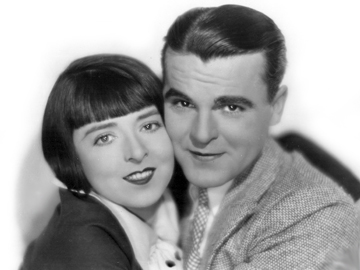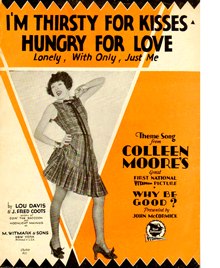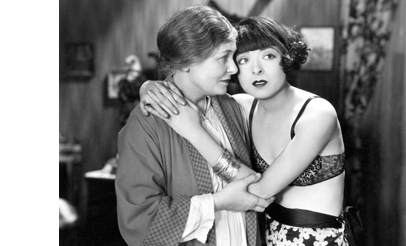
 |
|
|
|
You can't talk about the 1920s without Colleen Moore. F. Scott Fitzgerald called it the era of Flaming Youth with he as the spark and Moore as the torch. A hugely popular star of the silent screen, Moore's success didn't continue very long once sound came in, but she had no regrets. An excellent businesswoman and investor, she dropped her producer husband over his drinking and married three more times. She can be seen in Kevin Brownlow's Hollywood docu from the late 1970s, still sporting her helmet-bob haircut and looking great. 
Why Be Good? is Colleen Moore's final silent film, made just twelve years after her first in 1917. Moore practically initiated the screen image of the flapper, the 'any time, any party' girl with long legs, a short dress and boundless energy for dancing, drinking and fooling around -- a necking activity euphemized as 'spooning.' Moore's big hits had titles like Flaming Youth and Synthetic Sin. Although this little problem was very much in force, the movies were culturally controversial on the subjects of booze, rising hemlines, late-night carousing, and bobbed hairdos -- all taken as signs of the nearing apocalypse. The story of Why Be Good? spells out the problem for energetic, free-thinking young women, expressing some relevant points of view if not offering any useful advice. Looking for the right guy, but also for kicks, store clerk Pert Kelly (Moore) parties every night, winning Charleston contests. By day she works in a department store that employs a thousand sales girls just like her. She's often targeted by slimy gents like Jimmy Alexander (Louis Nathaneaux), who paws her in a dance club called 'The Boiler' but passes out from drinking gin. Pert lets the handsome Winthrop Peabody Jr. (Neil Hamilton) take her home, and they make a date. But his father owns the department store, and Winthrop is the new personnel manager who must discipline Pert the next morning for being late to work. That misunderstanding passes, but there are bigger issues. Pert's mother (Bodil Rosing) questions Winthrop's intentions: "Has he mentioned marriage?" Peabody Sr. asks his son to look into Pert's character -- if she likes to dance so much, maybe she'll 'go' with other men too. 
A card-carrying dancing doll in cotton stockings, Pert subscribes wholeheartedly to the Flapper Code. Responding to her father's 3:am criticism, she sums up her 'questionable' morals in one inter-title dialogue card: "Pop, listen to me! This is 1929, not 1899! I contribute as much money to this house as you do, and as long as I think it is harmless, I'm going to wear what I like, and do what I like! I want to go out, and dance, and have fun, as long as I can, as much as I can!" Pert Kelly is described as 'an effervescent American girl.' She dances fast, and among her peers pretends to be faster. It's all in the eyes. When Pert flirts, she describes herself as a wildcat hot enough to keep up with any dance, party, or man. Her theme song "I'm Thirsty for Kisses and Hungry For Love," is not exactly sheet music to bring to the next church social. Lothario Jimmy Alexander thinks Pert is giving him a green light, but he's an idiot and Pert can handle him. Winthrop is more restrained than his always-drunk friends -- actually, as played by Neil Hamilton, the young heir is both dull and dense. But he shows a kind respect for Pert. In this context any guy with an approach more civil than, "C'mere baby lemme kiss 'ya" is a keeper, a good marriage prospect. As it turns out, Winthrop is naïve and Pert a little mixed-up. And here's where the story becomes pure fantasy wish fulfillment. Winthrop is obviously attracted to Pert's sexy image, which is almost all that she shows him. But because he's a "man of quality," he also perceives the nice girl behind the flash and flesh. Winthrop's millionaire dad doesn't mind a bunch of rich kids making whoopee in his penthouse apartment at all hours, but he quietly asks his sonny boy to decide whether or not Pert's a 'good girl' before getting serious. To find out, Winthrop takes Pert to a roadhouse establishment where the private dining rooms have bedrooms attached. That'll force the issue. In a nice touch, we aren't shown what Pert sees when she opens the door to the next room. It's Forbidden Territory, Taboo. The screen might catch fire and send us all to Hell. As Barbra asks, do good girls do just what Mama says, when Mama's not around? Did teenage girls in 1929 freeze up and stop chewing their popcorn, or did they mentally urge Pert to Go For It?' That's the dodge with this movie about 'scandalous subject matter. Although everybody acts sophisticated, real 'sin' is some kind of rumor. Both Pert and Winthrop seem to be virgins. Pert spells out the need to appear wild and fast to her mother: "Sure I'm good, Mom. But I have an awful time hiding it. I'd be disgraced if it were ever found out!" 
Where do social, class and economic differences figure in? Um, not in this show. Nobody's concerned that Pert comes from a working class background and Winthrop lives in the clouds. If there's a fantasy in play, it's that the Peabodys of the world would tolerate the Kellys, and that there's a handsome Winthrop waiting for every hopeful Pert. Colleen Moore lives up to her reputation 100%. She's delightful, a bright-faced young woman with a direct connection to a lot of good, healthy emotions. Pert's scenes with Neil Hamilton are actually the weakest, as the story keeps them mostly strangers to each other, the better to build up their respective romantic fantasies / misunderstandings. The relaxed, handsome Hamilton is more eye candy than actor -- he's the same slightly dopey doofus caught peeping at Maureen O'Sullivan in Tarzan and His Mate. Thirty-six years later, he's equally good-looking and bland when reaching for the Bat Phone as Gotham City's Commissioner Gordon. The clever script finds ways of dispensing with Hamilton's actual presence. On her own, Pert interacts with a mannequin that stands in for Winthrop, first staring dreamily at it, and then messing up its tie when she thinks Winthrop is giving her grief. Pert also plays a love scene to Winthrop's shadow on a frosted glass window, tracing his handsome silhouette. It's another substitute for real interaction -- the romantic vision being sold here is really an internal process. If people take romantic cues from movies, no wonder so many of them foolishly judge their partners by how well they fulfill selfish fantasies. 
But Why Be Good? does hit the nail on the head. Pert lays out the truth about the double standard she must negotiate, between lonely virgin and popular slut: "Who is it demands the kissing and the spooning - who but you - you men! I suppose you'd like me if I wore long skirts and mittens and sat home knitting socks?" I think men like women with whom they can argue issues like that. It's a great test of mutual affection. Pert Kelly merely behaves as if she's sexually experienced, but Colleen Moore made other films where the flapper sexuality was more explicit. Yet she's never quite as direct as Clara Bow, most of whose characters look either VERY experienced, or really eager to get some, like now. Neither star transitioned well to the talkies, because they were supplanted by verbally sexy stage talent from back East, but also because they belonged too firmly to the era before the Wall Street crash. Why Be Good? was released six months before the Stock Market laid an egg, just a couple of weeks after the St. Valentine's Day Massacre. If we could get our minds past the old cars and clothing, we'd see that people in 1929 were engaged in the exact same conflicts we are today, minus iPhones and GPS. 1 The picture is great for spotting future stars in their (relative) infancy. Mischa Auer, Andy Devine, Phil Harris and Grady Sutton are said to be identifiable in dance and party scenes, and the experts say they've spotted Jean Harlow in the penthouse balcony scene, when Winthrop's gin-soaked friend almost falls over the rail. Last note -- future Godzilla reviser Terry O. Morse did the editing on this show -- at age 23! |
|||||||||||||||||||
Review Staff | About DVD Talk | Newsletter Subscribe | Join DVD Talk Forum
Copyright © MH Sub I, LLC dba Internet Brands. | Privacy Policy
Subscribe to DVDTalk's Newsletters
|